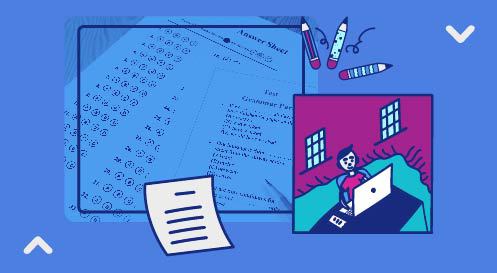How to Prepare for TOEFL Exam
Tips and Advice
25 February, 2022
|
7 mins read
By Eslam Massoud
Share

How to Prepare for TOEFL Exam
Tips and Advice
25 February, 2022
|
7 mins read

By Eslam Massoud
Share
TOEFL is a required test to get admitted to many universities abroad, including Australian Universities and Canadian universities. Most international universities ask you to provide evidence of your English proficiency, and that’s why it is important to familiarise yourself with international English tests like TOEFL.
What Is TOEFL?
TOEFL stands for Test of English as a Foreign Language. It is a standardised test to measure the English language ability of non-native speakers wishing to enrol in English-speaking universities. Besides IELTS, TOEFL is one of the two major English-language tests in the world and is accepted by more than 11,000 universities and other institutions in over 190 countries and territories.
TOEFL is a trademark of the Educational Testing Service (ETS), which is a private non-profit organisation. ETS designs and administers the tests; it also issues official score reports and sends them independently to institutions. The score reports are valid for two years following the test.
Formats and Content
Internet-based test
The TOEFL Internet-based test (iBT) measures 4 academic English skills: reading, listening, speaking, and writing the same way they are used in a classroom. This provides a true reflection of the student’s abilities.
The test is offered via 3 testing options:
the traditional TOEFL iBT test in a test centre.
the TOEFL iBT Home Edition.
the TOEFL iBT Paper Edition.
Essentials Test
The TOEFL Essentials uses a simple, flexible approach to create an engaging testing experience. It measures English skills in a variety of environments, beyond just academic, with the test questions adjusting to the student’s skill level as they go through the test.

Differences Between TOEFL and IELTS
The contents of both TOEFL and IELTS are largely similar; they both have four basic areas of competency. However, they differ quite a bit in the structures of their tests, the duration, the costs, and the scoring scales.
While TOEFL questions are almost entirely multiple-choice, IELTS tests have many types of questions throughout. These include short answer questions, small essays, and gap-filling tasks, where you'll fill in missing words.
Also, TOEFL is entirely computer-based. IELTS speaking tests, however, are done face-to-face with an examiner, which can be stressful for some.
In terms of length for the IELTS vs. TOEFL tests, The IELTS essay is a little shorter, at 250 words, compared to TOEFL's 300.
Tips to Prepare for the TOEFL Exam
Before you start preparing for the four sections of the exam, you should keep in mind the length of the TOEFL. The exam takes almost four hours, making it not only a language test but an endurance one as well. There’s a lot to cover, so there’s no chance of you getting bored, but you must also avoid making unnecessary mistakes due to fatigue.
1. How to Improve Your Reading Skills for TOEFL
The Reading section aims to test your ability to understand non-technical English texts, identify central ideas, and assimilate a wide range of vocabulary. Although you can’t predict the texts or the subjects that will appear in the test, there are still other types of preparations you can do to make sure the Reading section goes smoothly.
1. Familiarise Yourself With The Requirements
To avoid any unpleasant surprises on the day of the test, it’s important to be as familiar as possible with the requirements of the Reading section. You will be required to read and understand texts that deal with more than one idea or subject. You will then be asked to compare and contrast ideas, and to assess cause and effect.
2. Read Frequently
As obvious as it might seem, one of the best ways to prepare for the Reading section is to read a lot. Dedicate some time every day to actively reading similar types of texts to those you will be confronted with on the day of the test. These include news articles, books, and short stories. Also, try to vary the topics and subjects that you read about, don’t only read the ones you’re interested in, but rather, explore new topics like news, current affairs, science, history, economics, art, business, astronomy, etc. By reading a little every day, you will soon begin to see improvements in how quickly and effectively you can process texts in English.
Also, time management is one of the key skills required to pass the Reading section. Reading frequently will help you with that, as it will increase the amount of information you can process in one go.

3. Ask Yourself Questions and Summarize
Stop after every few paragraphs and ask yourself questions about what did you read about, what was the main idea, What was the conflict, and so on. Read the paragraphs again to check back for answers. When you finish reading, summarise what you’ve read about. Your summary can be done in writing or by speaking, this will help you practice for the writing or speaking sections at the same time.
4. Build Your Vocabulary
Developing a nice and wide vocabulary is important, even though you might encounter unknown words during the test. When you are practising for the Reading section, try to read every text completely without looking up any words. After you have read the whole text and tried to understand everything on your own, then you may look up words. This is very similar to the actual testing situation.
Make a list of unfamiliar words and translate them using an English-to-English dictionary; don’t use a dictionary that translates words from English to your native language. Using an English-to-English dictionary is important and can be very helpful to you as it will not only give you a clear English explanation for the word you do not understand, but it will also show you the synonyms (similar words) and antonyms (opposite words). This is hugely useful and very much applicable to TOEFL. Doing this will help your vocabulary grow and your confidence alongside it. By the time you get to your test day, you will have a much larger English vocabulary to help you out.
2. How to Prepare for TOEFL Listening and Speaking
The Listening section tests your ability to understand conversations and monologues on academic-style topics in English. To succeed in this section, you must be able to obtain and understand basic information, as well as assess a speaker’s opinion or point of view. Furthermore, Independent speaking questions test express your ideas and opinions in English. This means that for the Speaking section you will also need to demonstrate your ability to read and listen in addition to expressing yourself correctly.
1. Know What to Expect
The Listening section contains between five to seven recordings, each followed by comprehension questions. There are two different types of recordings:
Lectures: recordings of 3-5 minutes with only one speaker.
Conversations: recordings of 3 minutes between two speakers.
You will only hear each recording once and they include a lot of information, some of it relevant, while much of is it irrelevant. It’s important to learn to identify which information you need to answer the questions.To improve your listening skill, listen to English as regularly as possible. This can be very to do; just play the radio in English as you tidy your room, watch the news in English, listen to English music, and watch English films.
2. Take Notes
To help you remember details, you can write down notes while you’re listening; especially since you will only hear the recordings once. While listening carefully, don’t write down full sentences, just write down the most important and main ideas and as much supporting detail as you can. Also, make notes of changes in topic or digressions.
3. Practice Speaking
Developing your listening skills will enhance your pronunciation and will improve your fluency in speaking. After listening to a recording or watching a video, discuss the story in front of a mirror or to one of your friends in English. If you have trouble with a particular word, practice it until you get it right. Repeat the same word or phrase in English over and over again until you get comfortable. You can check the International Phonetic Alphabet (IPA) for pronunciation guidance. You can also make use of online English dictionaries, as most of them have a button that says the word aloud.
4. Take Advantage of Speech-to-Text Technology
This can be one of the best ways to receive instant feedback on your pronunciation. While speech recognition software was once very expensive and hard to access, there are now lots of options that make voice typing accessible to anyone with a phone and an internet connection.
One of the most favoured options is Google Voice Typing. To use this, just open a Google doc, click tools, select ‘voice typing’, and begin speaking. Google will detect your voice and begins auto-typing your words as you speak. If the typed words come out correctly, then you have pronounced the words successfully, and you can move on to the next sentence. If not, then try again, speak more slowly and clearly till you get it right.
3. How to Ready Yourself for TOEFL Writing
1. Understand the format
The Writing section tests your ability to write in English. It lasts 50 minutes and is divided into two sections.
Task 1: Integrated
You will be required to read an extract and listen to an excerpt from a lecture, then you will be given an essay question related to these materials. You will have to write a response to that question of approximately 150-250 words. Of the overall allotted time, this task is advised to take around 20 minutes from you.
Task 2: Independent
In this task, you will be given an open question and asked to write an essay response of approximately 300 words based on your own knowledge and experience. You’re advised to spend the remaining 30 minutes on this task.
2. Practice Timed Writing
While both parts of the Writing section require you to write a short essay, the second task can be more challenging than the first because there are no provided materials to use in your answer. That is why we advise you to spend more time working on the second task. Time yourself when practising writing about a specific topic. First, choose a topic, then set a timer for 20 or 25 minutes. Write for about 15-20 minutes, then leave 5 minutes for review and corrections.

3. Plan Your Response Before You Write And Use Structure
Before starting any of the tasks, it is essential to plan your responses and know what exactly you are going to discuss. You can plan your response for Task 1 as you read and listen to the preparatory materials. For Task 2, make sure to plan your response in detail, including structure and examples. Each of your responses on the two tasks should include introductory and concluding paragraphs, and several short body paragraphs with the main point and supporting detail. Your paragraphs should be appropriately linked together as well.
Finally, You can find many different types of free courses and resources available on the ETS website. These can help you learn and enhance your grammar and vocabulary, as well as improve your four English skills; reading, listening, speaking, and writing.
Commit, study, and prepare well! With consistency and hard work, there is no doubt that you will pass your TOEFL.
Tips and Advice
By Eslam Massoud
Share
Tips and Advice
By Eslam Massoud
Share





